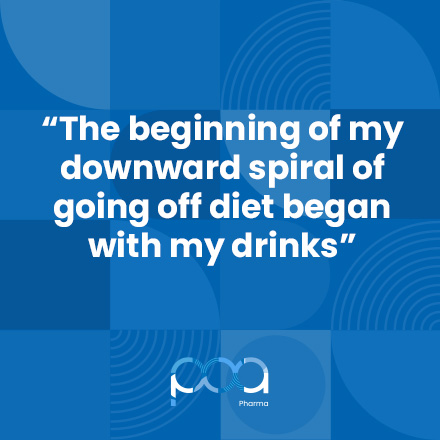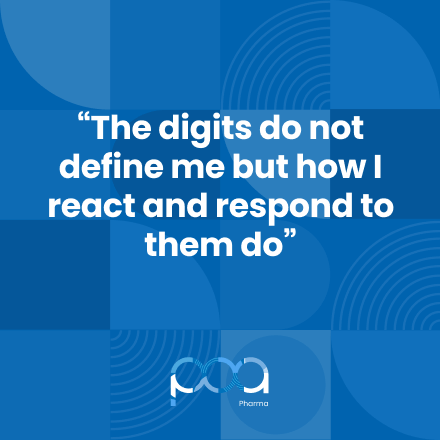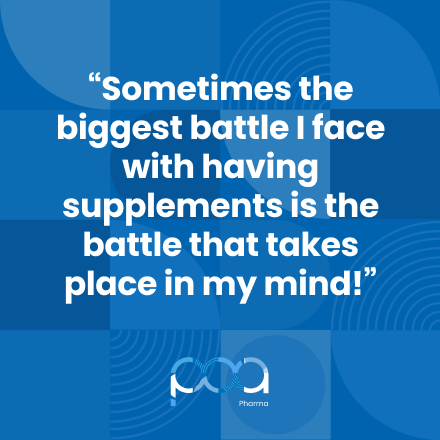Returning to Diet

< Back
22 January 2024
Hello everyone, my name is Clair Willcocks, I am 29 years old and I am Galen Medical Nutrition’s PKU blogger. I am an adult with PKU and I was diagnosed with Classical PKU 8 days after birth. I am on 5 exchanges of protein a day and currently taking the PKU EASY Microtabs substitute 6 times a day.
Returning to diet is one of the hardest but most important decisions that I have made for myself, for both my physical and mental well-being. It is so overwhelming the thought of going back to the strict diet after having the freedom of being off diet, putting those restrictions back onto myself, and learning how to do my diet all over again, so how did I manage it?
Dealing with the emotions
The beginning of my downward spiral to going off diet began with my drinks. I couldn’t face drinking them, and it wasn’t just the bad flavours, textures or smells which meant I kept letting them slide, or only having one or two a day thinking ‘that’ll do’; it was the emotional brick wall I was facing every time I had them. Having these three drinks a day makes me forever ‘different,’ that PKU is stuck with me for life and the memories of parents going “drink your drink, drink your drink.” I was spending all my precious energy trying to smash that wall down every time I had to have my drink, only for that wall to be built back up the next day. This emotional wall meant it would take me an hour or sometimes many hours to finish one drink, which meant it was warm and even more unpalatable. Never mind the other two that I also had to fit in that day!
It was my dad who found a way to break down this wall, to just get me back into the habit of doing the bare minimum, but the most important thing which was getting my drinks down me. He suggested when I had my drink, to set a countdown for 30 seconds and to just drink as much of it as I could in that time. No emotion or overthinking, just drink it. If it wasn’t finished by the end of the 30 seconds, then to tip the rest away, to just try again next time and it was shocking but it really worked! I think it was a shock and awe tactic with my brain. Focusing on the ticking clock made me forget the emotions and pain behind it. I just kept doing it until it was another emotionless driven habit like brushing my teeth or putting deodorant on. I’m still not perfect, occasionally the wall gets built back up, especially when I’m tired or I’ve had a tough day, but I know I have the skills now to get through it.
Food and cooking were no different. Ordering prescriptions from my GP and trying to cook and weigh food were again reminders that PKU is something that will always be a part of who I am. Especially when I had to weigh food, as it was a literal representation of how restricted my diet was. With food, it was all about making baby steps towards healthier eating. Not sitting there expecting myself to cook a whole vegan paella in one hit, not forcing myself to attempt to cook a roast dinner every night, it was just about the little wins. Challenging myself to cook one completely exchange free meal, replacing my exchange snacks with free to eat snacks from my prescription foods, so I didn’t have to worry about the emotions behind weighing or measuring.
As always, social media was a huge pressure. I saw pictures of low protein pies, risottos and stir fries and go “oh god, that’s what I should be making!” but I realised I needed to turn that pressure off in my head, that just because someone was maybe further ahead of me in their diet, doesn’t mean I was failing in mine. I reminded myself, as you have to with all social media, to be kind to myself, to give myself time to work up to that; again, making it all about these small steps to get over the emotional barriers.
Dealing with the practical
One change that I made, which helped me take the pressure off myself, was taking the time to find what vegetables I enjoyed cooking as well as eating. I recognise that before I would fall into the same emotional traps repeatedly. I would have a shopping cart full of veg (lettuce, cabbage, carrots, cucumber, sweetcorn, tomatoes, beetroots, suede, potato, peppers, onions… argh!) and I wouldn’t use any of it, not realising it was because it made me feel so overwhelmed. Of course, I wouldn’t and couldn’t have eaten all the veg quickly enough before it soon all went bad, so then I’d then have to go through the guilt of having to throw away food that would have been fine if I had only cooked it! I would do that nearly every week and then wonder why I was so upset all the time. So instead, I challenged myself to find two or three vegetables I know would work in any meal, and that’s it. For winter where I’d have warmer meals, like pasta dish or a curry, it would be peppers, courgettes, and radishes or in the summer when I was in the mood for salads it would be cucumbers, tomatoes and lettuce. I’d base my food shopping on what I fancied that week rather than ‘what I ought to be eating’.
I reached out to my dietician and asked her to help get my daily intake of protein back in control. She asked me to do an honest food diary, of exactly what I was eating, stressing that she wasn’t going to judge me or tell me off but just so she knew what she was dealing with first in terms of me returning to diet. What shocked me the most about doing a food diary was finding out the snacks that I had been eating were causing the biggest damage towards my exchanges! Whether packed in my bag for lunch or bought from the work vending machine, I thought they were okay because they were ‘only’ 1, 1.5 or 2 exchanges but it turns up if you have a few snacks like that a day, they soon start to add up. Rather than the 5 exchanges I should have been having a day, it turned out I was easily having 9-10 exchanges.
So I decided to try and cut those ‘heavier’ snacks out of my life, I replaced walkers crisps which were 1.5g exchanges each to Pombear crisps which were only half each. I replaced chocolate bars with fruit or fruity snacks for lunch bags that were exchange free, basically getting rid of anything in the house that individually over 1g of protein. No matter how good I thought I could be, if I had a pack of mini rolls in my cupboard or a 6 pack of crisps in my workplace draws, I know I had no self-control. I could easily eat through all of them without even thinking, but I can’t eat protein if it’s not in the house! So I just had to get rid of it all. What really helped me with this was the NSPKU website, which has great resources on all sorts of supermarket foods that are completely free of protein which you can replace higher protein items with.
For my supplements, I again reached out to my dietician team, asking them to send as many samples from as many different companies as possible to try. It’s amazing how much change the world of PKU supplements has seen just in the last few years, so it’s always worth trying as many samples as possible to see if anything new has come out that you may have missed, that could be so much better then what you’ve been on for decades! Looking online to see what others are having and what they recommend also helps. I know many of my friends have switched to the PKU Easy Microtabs because they heard about them from me before they even heard from their dieticians. Explore all the possibilities of what is new out there, whether that’s supplements or food!
Outside factors
One reason I went off my diet wasn’t just because of how difficult PKU was, but the changes I was going through in my own life. I now recognise at 16 I had a whole world of choice introduced to me when I was due to leave secondary school. I was choosing what job I wanted to do, whether I wanted to go to university or college, what course to pick, what friends I wanted to stay in touch with. I couldn’t help but have this overwhelming feeling that I could chose every part of my future, but not the part of me that was PKU. That part of me felt like it would be the same limited diet and world for the rest of my life. It was too much for my ‘immature’ 16-year-old mind to handle.
I was also away from the watching eyes of my mum; I was spending more time with my boyfriend and friends. Friends I wasn’t entirely honest with about how much help I needed with my PKU, that I felt I could ‘get away’ with being off diet. When my boyfriend and I moved in together at 20, this was heightened as I didn’t have any parents watching over me at all! As mentioned in my previous blog ‘Adulting’, I just wanted to be my own person, I didn’t want to live in this limited world of food and drinks, weighing and cooking.
When I decided to return to diet at 25, I started to see the positive effects of being on diet. I was no longer foggy headed, over emotional, I started to lose weight (I gained 2 stone in under a year being off diet). The scarier side effects like slurred speech, loss of concentration and making mistakes at work were starting to ease off. I was starting to realise that being off diet really wasn’t worth these symptoms. Even when I thought being off diet wasn’t affecting me, deep down somewhere it really was.
My friends and family could see how much better I felt in myself. The fog that was permanently over my head was finally lifting and that helped me realise, no matter how difficult the diet is, it is worth it and that I don’t have to let PKU get to me because there are so many more options for me and other PKUer’s now. I did find good things that could replace the unhealthy items, that my world was actually not so limited. My friends wanted to help me, they wanted to support me in anyway possible, whether that’s having snacks in their house or finding specific restaurants they knew I could happily find many things to choose from.
At huge chain restaurants there are now vegan menus available at nearly every restaurant, supermarkets are making their own brands of coconut based dairy products, there are so many PKU companies with whole ranges of food and supplements to try and even though the sugar tax has limited us in some soft drinks, supermarket own brand drinks and health-conscious drink companies are starting to use less artificial sweeteners. It’s a huge world out there for people with dietary needs.
Conclusion
It is so hard, to try and take away all that emotional burden and conflict I felt with cooking or having my supplements, but I know now that it is so worth it, to feel healthier, happier, and more in control of my life. I now know that it’s not the diet that controls me, but that I control my diet. My loved ones say they can notice the difference in me when I’m on diet, that I am less anxious and healthier, and I know I notice the difference in myself. So, I now make sure to get help from my husband and my friends, to ask them if we can go out to eat in places that are more suitable for me, to have food in the house that I can eat if I’m staying over. I ask them to remind me to have my drinks, to check in with me to see if I have done my blood spots; good friends want to help because they want to see you happy and healthy.
As much as social media can put unnecessary pressure on us to have a ‘picture perfect’ diet, it can also be an incredibly useful tool. I know from personal experience, the online PKU community is so incredibly helpful, the ideas, recipes and support shared without judgement is so precious. The NSPKU website also is invaluable as it has great resources, and dieticians are there for us and want to help us guide ourselves through the battle of returning to diet. I am proud to say that now I am back on diet, I am not just surviving, I am thriving and I’m sure in the future I will still have more struggles to face, more battles to fight and more walls to knock down, but I feel more prepared now than ever.


